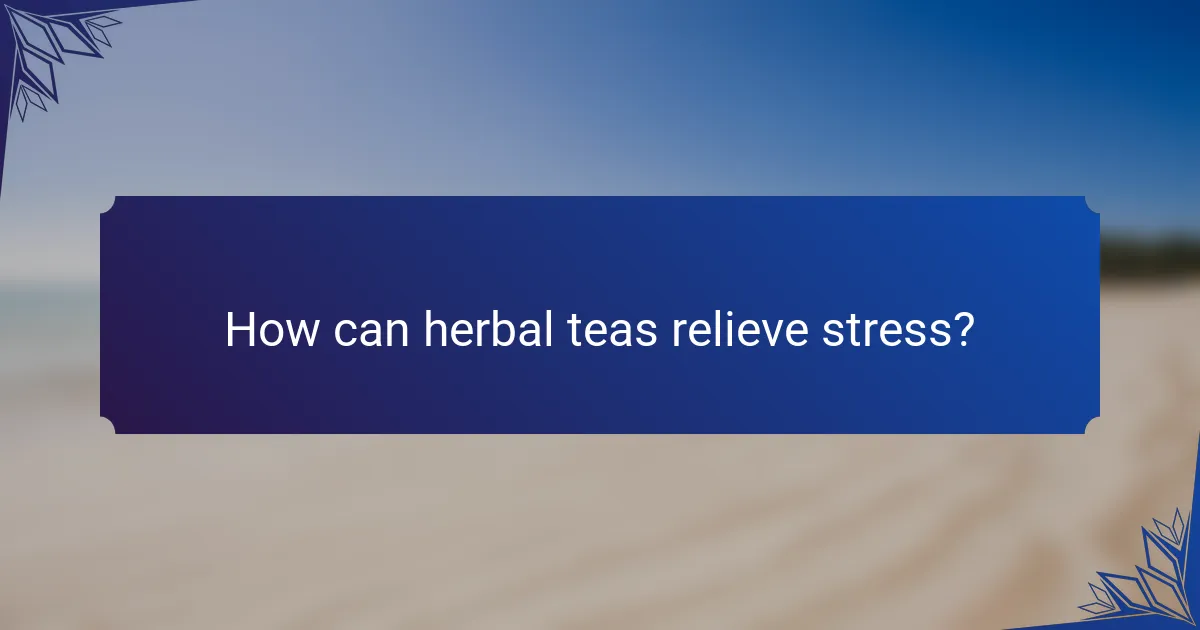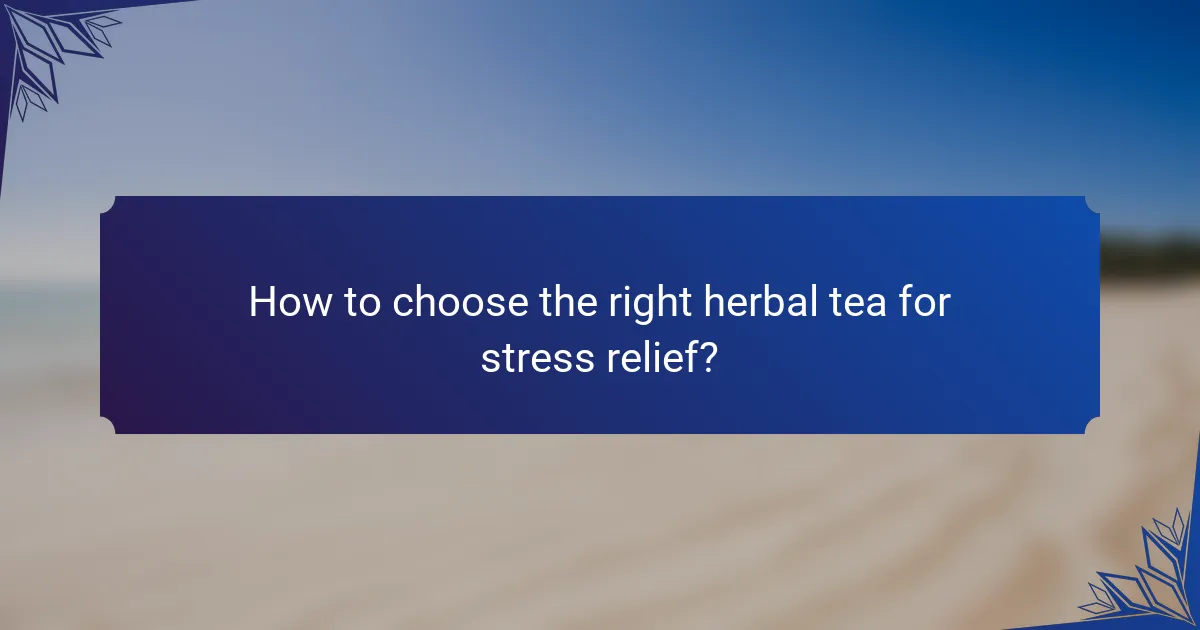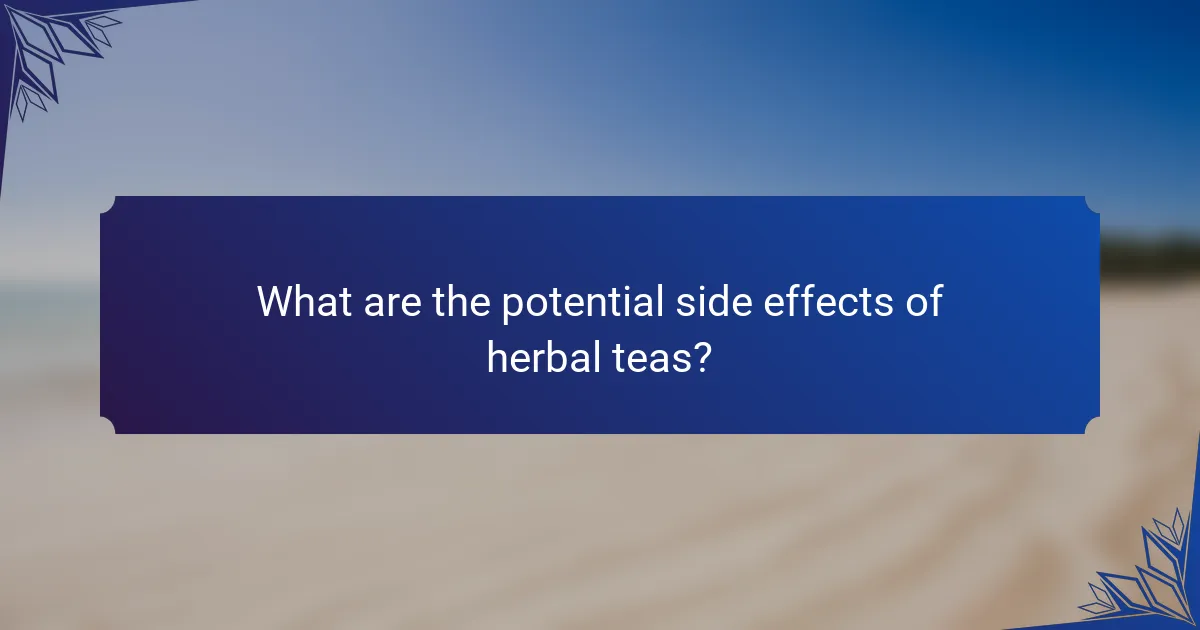Herbal teas are a natural way to relieve stress, promoting relaxation and reducing anxiety through their calming properties. Kitchen herbs like mint, thyme, and rosemary can be easily incorporated into your daily routine, whether through teas or culinary uses, to enhance your well-being. Proper preparation, including selecting the right herbs and steeping them correctly, is essential to maximize both flavor and health benefits.

How can herbal teas relieve stress?
Herbal teas can effectively relieve stress by promoting relaxation and reducing anxiety. Many herbal ingredients contain compounds that interact with the body’s stress response, helping to calm the mind and body.
Chamomile tea benefits
Chamomile tea is renowned for its calming properties, often used to aid sleep and reduce anxiety. It contains apigenin, an antioxidant that binds to specific receptors in the brain, promoting relaxation.
Drinking chamomile tea before bedtime can improve sleep quality and help manage stress levels. Aim for one to two cups daily for optimal benefits.
Lavender tea effects
Lavender tea is celebrated for its soothing aroma and stress-relieving effects. The scent of lavender has been shown to lower heart rate and blood pressure, contributing to a sense of calm.
Consuming lavender tea can help alleviate symptoms of anxiety and improve mood. A cup in the evening can be particularly beneficial for winding down after a long day.
Passionflower tea properties
Passionflower tea is known for its ability to reduce anxiety and improve sleep quality. It contains flavonoids that may increase levels of gamma-aminobutyric acid (GABA) in the brain, which helps to calm nerves.
Drinking passionflower tea can be a great addition to your evening routine, especially if you struggle with racing thoughts before bed. One cup can be effective, but consult a healthcare provider if you are on medication.
Valerian root tea advantages
Valerian root tea is often used as a natural remedy for insomnia and anxiety. It works by increasing GABA levels in the brain, promoting relaxation and sleepiness.
For those dealing with stress-related sleep issues, valerian root tea can be taken about 30 minutes before bedtime. However, it is advisable to limit use to a few weeks at a time to avoid dependency.
Rooibos tea calming effects
Rooibos tea is caffeine-free and rich in antioxidants, making it a great choice for stress relief. It contains compounds that may help reduce cortisol levels, the hormone associated with stress.
Enjoying rooibos tea throughout the day can provide a gentle calming effect without the jitters associated with caffeinated beverages. Aim for two to three cups daily for best results.

Which kitchen herbs are best for stress relief?
Several kitchen herbs are known for their stress-relieving properties, with mint, thyme, and rosemary being among the most effective. These herbs can be easily incorporated into your diet through teas, cooking, or as garnishes to help promote relaxation and reduce anxiety.
Mint herb properties
Mint is renowned for its refreshing aroma and flavor, which can help alleviate stress and promote a sense of calm. The menthol in mint has a soothing effect on the body, potentially lowering anxiety levels and improving mood.
To enjoy the benefits of mint, consider brewing a cup of mint tea or adding fresh mint leaves to your water. This can be a simple way to incorporate its stress-relieving properties into your daily routine.
Thyme herb benefits
Thyme is not only a flavorful culinary herb but also possesses calming effects that can help reduce stress. It contains compounds that may support relaxation and improve overall emotional well-being.
Using thyme in cooking or as a tea can provide both flavor and stress relief. A common method is to steep fresh or dried thyme in hot water for a soothing herbal infusion.
Rosemary herb effects
Rosemary is often associated with memory enhancement, but it also has stress-relieving properties. The aroma of rosemary can reduce cortisol levels, which is the hormone linked to stress.
Incorporating rosemary into your meals or brewing it as a tea can help harness its calming effects. Try adding fresh rosemary to roasted vegetables or steeping it in hot water for a fragrant herbal drink.

What is the best way to prepare herbal teas?
The best way to prepare herbal teas involves selecting the right herbs, using appropriate water temperatures, and allowing sufficient steeping time. These factors significantly influence the flavor and health benefits of the tea.
Steeping techniques
Steeping is the process of soaking herbs in hot water to extract flavors and nutrients. Generally, herbal teas should be steeped for 5 to 15 minutes, depending on the type of herb. For stronger flavors, longer steeping times are recommended, but be cautious as over-steeping can lead to bitterness.
Use a covered vessel to retain heat during steeping. A common ratio is 1 teaspoon of dried herbs per cup of water. Adjust the amount based on personal taste preferences.
Infusion methods
Infusion methods involve using hot water to extract flavors from herbs. Common techniques include using a teapot, a French press, or a tea infuser. Each method allows for different levels of control over steeping time and temperature.
For delicate herbs like chamomile, use water just below boiling point (around 90°C or 194°F) and steep for 5 minutes. For robust herbs like peppermint, boiling water (100°C or 212°F) is suitable, steeping for up to 10 minutes.
Cold brew options
Cold brewing herbal tea is a refreshing alternative that enhances the natural flavors without bitterness. To cold brew, combine 1 tablespoon of dried herbs with 4 cups of cold water and refrigerate for 6 to 12 hours.
This method is ideal for herbs like hibiscus and mint, yielding a smooth, flavorful beverage. Strain the herbs before serving, and enjoy the tea chilled or over ice for a refreshing drink.

How to choose the right herbal tea for stress relief?
Selecting the right herbal tea for stress relief involves considering your flavor preferences, health needs, and ingredient sourcing. Different herbs offer various calming effects, so understanding these factors can help you find the most suitable option for your relaxation routine.
Flavor preferences
Your personal taste plays a significant role in choosing an herbal tea for stress relief. Popular options include chamomile, known for its sweet and floral notes, and peppermint, which offers a refreshing minty flavor. Consider trying a few different varieties to identify which flavors you enjoy most.
If you prefer a more robust taste, look for blends that include spices like ginger or cinnamon. These can add warmth and depth while still providing calming effects.
Health considerations
When selecting herbal teas, it’s essential to consider any health conditions or medications you may be taking. For example, chamomile is generally safe but may interact with blood thinners. Always consult with a healthcare professional if you have concerns about specific herbs.
Additionally, some herbal teas can have caffeine, which may counteract the calming effects you seek. Opt for caffeine-free varieties to ensure you promote relaxation without unwanted stimulation.
Ingredient sourcing
Sourcing high-quality ingredients is crucial for maximizing the benefits of your herbal tea. Look for brands that provide organic options, as these are less likely to contain pesticides or additives. Check for certifications that ensure quality and sustainability.
Local herbal shops or farmers’ markets can be excellent sources for fresh herbs. This not only supports local businesses but also allows you to ask questions about the sourcing and preparation of the herbs you choose.

What are the potential side effects of herbal teas?
Herbal teas can offer various health benefits, but they may also lead to side effects in some individuals. Common issues include allergic reactions, digestive disturbances, and interactions with medications.
Allergic reactions
Allergic reactions to herbal teas can occur, particularly in individuals sensitive to specific plants. Symptoms may include skin rashes, itching, or gastrointestinal discomfort.
Common allergens in herbal teas include chamomile, echinacea, and peppermint. If you have known allergies to these herbs or related plants, it is advisable to avoid consuming them.
To minimize the risk of an allergic reaction, start with a small amount of any new herbal tea and monitor your body’s response. If any adverse symptoms arise, discontinue use and consult a healthcare professional.
